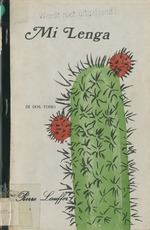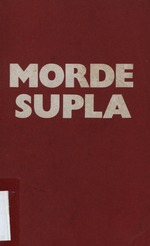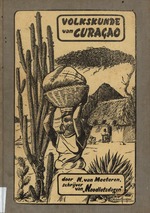 |
| Mi lenga (Di dos tomo) |
|
| Creator: | | Lauffer, Pierre Antoine |
| Publication Date: | | 1971 |
| Type: | | Book |
| Format: | | 2 dl. : ill., foto's ; 21 cm. |
| Source Institution: | | University of Netherland Antilles |
| Holding Location: | | University of Netherland Antilles |
| Subject Keyword: | |
Papiamentu; taalkunde
Schoolboeken
|
| Language: | | Papiamento |
“...aribariba. (no bon).
No ta asinasina sa bira riku. (no ta fasilmente) Dochi tin ocho yu. Nan ta kabeskabes.(djis tras di otro).
Kachikachi di kfi.
Klkl bow di kachete. (manera kalakuna). Un kach kankan (yen) di pruga.
Karikari (karni mul di tribon).
Blachinan di...” |
|
| Mi lenga (Di dos tomo) |
|
 |
| Morde supla |
|
| Creator: | | Brenneker, Paul Hubert Franz |
| Publication Date: | | 1968 |
| Type: | | Book |
| Format: | | 500 p. ; 14 cm. |
| Source Institution: | | University of Netherland Antilles |
| Holding Location: | | University of Netherland Antilles |
| Subject Keyword: | |
Proza; Papiamentu
Stichtelijke lectuur; Nederlandse Antillen
|
| Language: | | Papiamento |
“...ta bini cas. E ta cuminda su esposa cu su jiu, i e ta bai laba su man den cushina. Ata ... ei tin dos koppie cu skotter, cu kachikachi i koffie aden. Dos koppie ... ? Pa mas sigur e ta hole un ratu. Si ta koffie mes.
Linda, ta ken tabata aki?
Shon Mi, mi ruman...” |
|
| Morde supla |
|
 |
| Volkskunde van Curaçao |
|
| Creator: | |
Meeteren, van, Nicolaas, 1861-1953
Latour, M.D.
|
| Publisher: | | Drukkerij Scherpenheuvel ( Willemstad , Curaçao ) |
| Publication Date: | | 1947 |
| Type: | | Book |
| Format: | | 248 p. : ill., foto's, muz. ; 24 cm. |
| Source Institution: | | University of Netherland Antilles |
| Holding Location: | | University of Netherland Antilles |
| Subject Keyword: | |
Antropologie
Folklore; Curaçao
Volksgeneeskunde
|
| Language: | | Dutch |
“...werd dan door de persoon zelf omgekeerd om het laatste restje koffie te laten wegloopen en uit den vorm van het koffiedik (kachikachi"), dat achter bleef, wist de ingewijde de toekomst te vrspellen. Ik heb hier gesproken van ingewijde, omdat het mij wil voorkomen...” |
|
| Volkskunde van Curaçao |
|
|